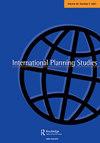Master planning in the megalopolis: exploring the opportunities and barriers for urban governance reform in Bangalore, India
IF 1.5
Q4 REGIONAL & URBAN PLANNING
引用次数: 0
Abstract
ABSTRACT Residents from the Indian city of Bangalore perceive the degradation of quality of life primarily attributed to unprecedented levels of growth. The city has been guided by routinely updated master plans since 1985, which should have anticipated and mitigated the consequences of urban growth. Today, new forms of collective action are emerging to gain control over urban space, life and ultimately governance. Based on the voices of multi-sector stakeholders in various ‘domains’ of urban governance during the latest master planning process, this paper provides an exploratory case study about the relationship between the planning process and governance reform. Master planning could facilitate reform through collaborative decision-making, accountability for outcomes, and greater inclusion. Master planning processes need to go beyond current means of citizen participation and ensure sustained social learning among the various actors at the ward-level to strengthen urban governance structures. More research is needed for planners in this area.大城市的总体规划:探索印度班加罗尔城市治理改革的机遇和障碍
印度城市班加罗尔的居民认为,生活质量的下降主要归因于前所未有的经济增长水平。自1985年以来,该市一直以定期更新的总体规划为指导,该规划本应预测并减轻城市增长的后果。今天,新的集体行动形式正在出现,以获得对城市空间、生活和最终治理的控制。基于最新总体规划过程中城市治理各个“领域”的多部门利益相关者的声音,本文提供了一个关于规划过程与治理改革之间关系的探索性案例研究。总体规划可以通过协作决策、结果问责制和更大的包容性来促进改革。总体规划进程需要超越目前公民参与的手段,并确保各级各行动者之间持续的社会学习,以加强城市治理结构。这方面的规划人员需要进行更多的研究。
本文章由计算机程序翻译,如有差异,请以英文原文为准。
求助全文
约1分钟内获得全文
求助全文
来源期刊

International Planning Studies
REGIONAL & URBAN PLANNING-
CiteScore
4.60
自引率
4.80%
发文量
20
期刊介绍:
Planning, at urban, regional, national and international levels, faces new challenges, notably those related to the growth of globalisation as both an objective socio-economic process and a shift in policy-maker perceptions and modes of analysis. International Planning Studies (IPS) addresses these issues by publishing quality research in a variety of specific fields and from a range of theoretical and normative perspectives, which helps improve understanding of the actual and potential role of planning and planners in this context.
 求助内容:
求助内容: 应助结果提醒方式:
应助结果提醒方式:


